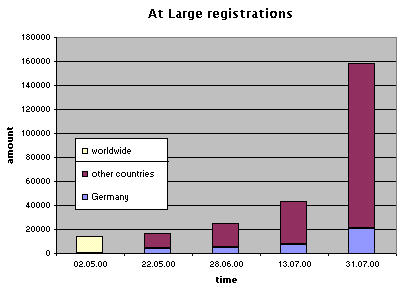





|

III.4. The Spiegel Online campaign
Already in the planning for the At Large elections, ICANN's Membership Advisory Committee feared capture by special interests (ICANN MAC 1999). The committee's report from March 1999 did not mention the possibility that stronger media interest and activity in one country may lead to a distortion of the relative participation within an electoral region. The following section covers the Spiegel Online initiative "I can! -- eLection 2000" that started with the headline "Aufruf zur Wahl der 'Regierung des Internets'" ("Call for the election of the 'government of the Internet'"; 2 May).

a. Initial situation
On the day the Spiegel Online initiative started, only 14,167 persons had signed up for the At Large elections. The first statistics showing the distribution of registrations among countries were published twenty days later, on the 22nd of May. At this point, 16,919 persons were registered worldwide, including 4,107 from Germany and 6,915 from the United States. The remaining 5,897 registrations were distributed over 141 countries, largely from the OECD. The number of registrations from Germany were thus proportionally high already in the early stages of the election; the relative share of worldwide registrations dropped from 24.3% (22 May) to 12.9% (31 July).
b. Candidate selection and reporting
The Spiegel Online initiative consisted of two elements: a procedure, according to which readers should propose candidates, and a special page within the Netzwelt section of the Spiegel Online web site with a call for participation. The original plan to collect and present candidate proposals, to organise an preliminary online election and to submit them as a petition to ICANN, was dropped later. But the search for suitable candidates had begun and drew additional attention to the At Large elections. Shortly before the registration deadline, the German Federal Education and Research Ministry suggested to organisations and associations by e-mail to nominate their own candidates.
The special ICANN coverage was at least equally important: Continuously, articles about the organisation were added to the special sections of Spiegel Online and Heise Online. Until the registration deadline, 31 articles about ICANN appeared in Spiegel Online, 20 were published in Heise Online.
c. Reactions outside Germany
The Spiegel Online initiative was not only judged positively. The Economist wrote: "What critics fear most is that the membership […] will be captured by special interests. To some extent this is already happening: Because German magazines and newspapers such as Der Spiegel and Die Zeit are running a voter-registration campaign, a fourth of the membership is currently German" (10 June). Except for the Economist article, the Spiegel Online initiative was seldom mentioned in print media outside Germany (four marginal mentions).
In fact, the print media Der Spiegel and Die Zeit did not participate in the initiative, only their online equivalents. Not all the online media that supported the initiative put up their own web pages about ICANN. In the end, the ICANN coverage in Spiegel Online led to an increasing interest, but the pages about ICANN fell considerably short of the usual access figures for one of the largest German online news sites.
Outside Germany, the online magazines of Le Monde (France) and Der Standard (Austria) participated in the initiative. Many other European online media, among them sites from the United Kingdom, Italy and Spain, were invited before the start, but did not choose to join. Responsibles at Spiegel Online assume that it has been partly a problem to assign ICANN issues to an editorial department, since it is a mixture of political, economical and computer issues.
d. Direct and indirect consequences
The high participation of German Internet users cannot be directly attributed to the Spiegel Online initiative: After the critical Economist article, the extent of the coverage was reduced, whereas the highest increase of registrations took place in the fourteen days before the registration deadline. This was the time period when registrations greatly increased in a number of countries, even though the ICANN registration server problems did not allow everyone to register.
The involvement of Spiegel Online and the printed Der Spiegel has nevertheless been far from ineffective. In March, an article about ICANN in the print edition of Der Spiegel was among the first to make the organisation know to the German general public. Additionally, Der Spiegel has a considerable readership among other journalists, so the article titled "Herrscher des Netzes" ("Ruler of the Net"; 13 March) set the agenda for subsequent media coverage. The difficult task of the volunteers of ICANN's Membership Implementation Task Force -- making ICANN and the elections known -- was in Germany taken on early by the media.


|
|